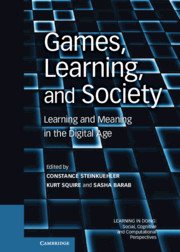Book contents
- Frontmatter
- Contents
- Contributors
- Series Foreword
- Foreword
- Acknowledgments
- Section I Games as Designed Experience
- 1 Introduction to Section I
- 2 Designed Cultures
- 3 Theme Is Not Meaning
- 4 Our Cheatin’ Hearts
- 5 Playing the Odds
- 6 Nurturing Lateral Leaps in Game Design
- 7 Uncharted 2: Among Thieves – How to Become a Hero
- 8 Interview with Harmonix
- 9 Yomi
- Section II Games as Emergent Culture
- Section III Games as Twenty-First-Century Curriculum
- Index
- References
9 - Yomi
Spies of the Mind
Published online by Cambridge University Press: 05 August 2012
- Frontmatter
- Contents
- Contributors
- Series Foreword
- Foreword
- Acknowledgments
- Section I Games as Designed Experience
- 1 Introduction to Section I
- 2 Designed Cultures
- 3 Theme Is Not Meaning
- 4 Our Cheatin’ Hearts
- 5 Playing the Odds
- 6 Nurturing Lateral Leaps in Game Design
- 7 Uncharted 2: Among Thieves – How to Become a Hero
- 8 Interview with Harmonix
- 9 Yomi
- Section II Games as Emergent Culture
- Section III Games as Twenty-First-Century Curriculum
- Index
- References
Summary
What enables the wise sovereign and the good general to strike and conquer, and achieve things beyond the reach of ordinary men, is foreknowledge. This foreknowledge cannot be elicited from spirits; it cannot be obtained inductively from experience, nor by any deductive calculation….the dispositions of the enemy are ascertainable through spies and spies alone.
—Sun Tzu, The Art of WarSun Tzu held spies in the highest regard, saying that they should be rewarded more liberally than any other relation in war because the foreknowledge they can provide is more valuable than any other commodity. When one knows where the enemy will strike, one doesn’t need to spread one’s forces thin protecting a dozen possible targets. When one knows when the enemy is unprepared, one can strike and be assured of victory. When one knows the habits of the enemy general, those habits can be turned against him. The use of spies to gain foreknowledge is like being able to see into the future.
I see only one move ahead, but it is always the correct one.
—Jose Raoul Capablanca, Third World Chess ChampionYomi
In competitive games, there is little more valuable than knowing the mind of the opponent, which the Japanese call yomi. All the complicated decisions in game theory go away if you know exactly what the opponent will do next. Sun Tzu says that reading minds is for the spirit world, and on that I cannot comment, but I have witnessed firsthand the ability of some players to “achieve things beyond the reach of ordinary men” through eerily powerful yomi. Perhaps these players are simply adept at “studying the details of the enemy,” but it seems to go far beyond that in some. There is one player whom I would even say has a supernatural ability to spy on the minds of others, knowing which moves they will next make – if it weren’t such an absurd thing to say. But believe me, those who have witnessed Japan’s fighting-game player Daigo Umehara do speak of these things in hushed tones, fancying that they may be true.
- Type
- Chapter
- Information
- Games, Learning, and SocietyLearning and Meaning in the Digital Age, pp. 116 - 120Publisher: Cambridge University PressPrint publication year: 2012



